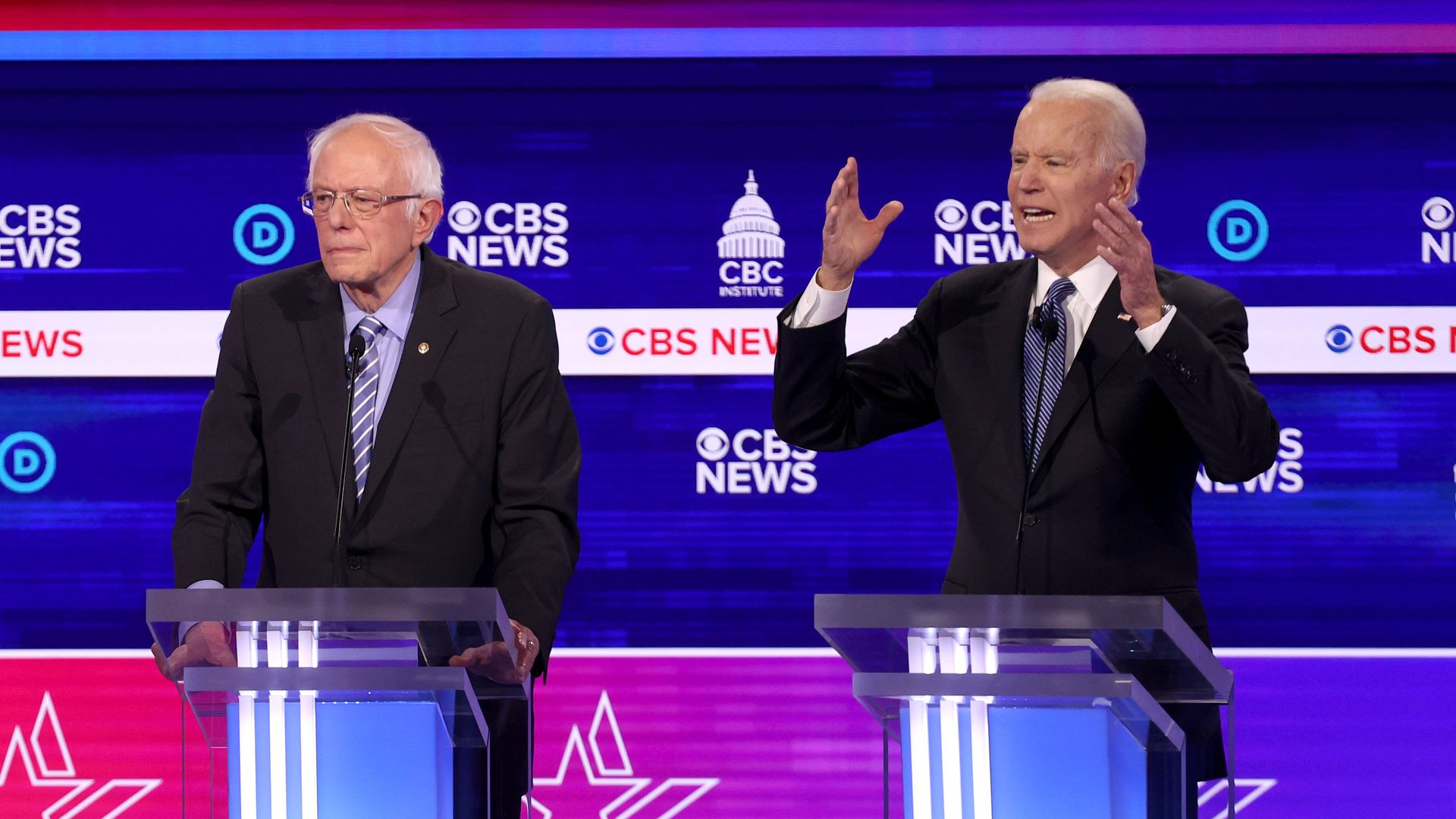
Former Vice President Joe Biden, right, makes a point during Tuesday's Democratic presidential debate, while Vermont Sen. Bernie Sanders listens. Photo: Win McNamee/Getty Images
The 10th Democratic debate was billed as the most consequential of the primary thus far, but Tuesday night's high-stakes affair was at times awkward and unfocused as moderators struggled to rein in candidates desperate to make one last splash before Saturday's primary in South Carolina and Super Tuesday.
The big picture: After cementing himself as the Democratic favorite with a sweeping win in Nevada, Sen. Bernie Sanders came under fire as the front-runner for the first time on the debate stage. Former New York Mayor Michael Bloomberg, who will be on the ballot for the first time next Tuesday, was a progressive foil once again, but he appeared more prepared after taking a drubbing at the Nevada debate.
Takeaways
1. A revitalized sense of urgency permeated the performance of nearly every candidate on stage, as Sanders threatens to run away with an insurmountable delegate lead after Super Tuesday.
- The usually reticent Joe Biden barked at moderators for cutting into his time and took aim at Sanders, Bloomberg, and one new target — Tom Steyer, who has poured millions into advertising in South Carolina. Biden has long-viewed South Carolina as his firewall due to his strong support among black voters — which Steyer has eaten into — and even a meager win could mean an end to the former vice president's campaign.
- Pete Buttigieg spoke pointedly about racial justice and policing, an issue that he said he approaches "with humility." He was the first in several debates to acknowledge the all-white field. Buttigieg performed well in overwhelmingly white Iowa and New Hampshire, but winning over black voters is the existential challenge of his campaign.
2. Sen. Elizabeth Warren, who saw a bump in national polling after her breakout debate performance last week, clearly saw her critical treatment of Bloomberg as her best shot to save her campaign.
- Warren landed the biggest blow of the night by accusing Bloomberg of telling a pregnant employee to "kill it" — an allegation Bloomberg vigorously denied, but for which the Washington Post has corroborated with a third-party witness.
- She also attacked Bloomberg for his past endorsement of Republicans, including South Carolina's own Sen. Lindsey Graham as well Massachusetts Republican Scott Brown, whom she defeated in her 2012 Senate race. “The core of the Democratic Party will never trust him," Warren argued. "He is the riskiest candidate standing on this stage."
3. Establishment Democrats have been sounding the alarm about how a ticket led by Sanders, a democratic socialist, will affect down-ballot races in the moderate districts that helped Democrats take the House in 2018. That concern manifested on the debate stage for the first time.
- Buttigieg, who clashed with Sanders several times, said: "If you want to keep the House in Democratic hands, check with the people that turned the House blue. 40 Democrats are not running on Sen. Sanders’ platform—they’re running away from it as fast as they possibly can."
- Bloomberg added: "Donald Trump and the House and the Senate and some of the state houses will all go red, and then between gerrymandering and appointing judges for the next 20 or 30 years we’re going to live with this catastrophe.”
- Bonus: The billionaire may have had a Freudian slip when he referenced the $40 million he spent supporting Democrats in the 2018 midterms. "I bought — got them [elected]," Bloomberg said, correcting himself quickly.
4. The dominant attack line against Sanders this week from Republicans — and even some Democrats — was his praise for Cuban dictator Fidel Castro's literacy program. He refused to disavow the comments, arguing it is possible to condemn authoritarianism while acknowledging good things those governments may have done.
- Buttigieg seized on the comments to reinforce his view of how polarizing Sanders would be as a nominee: "I am not looking forward to a scenario where it comes down to Donald Trump with his nostalgia for the social order of the 1950s and Bernie Sanders with a nostalgia for the revolutionary politics of the 1960s."
The bottom line: The coronavirus, the humanitarian catastrophe in Idlib, and President Trump's interference in the rule of law have been among the biggest global storylines over the past few weeks, but they received little to no attention at Tuesday's debate.
